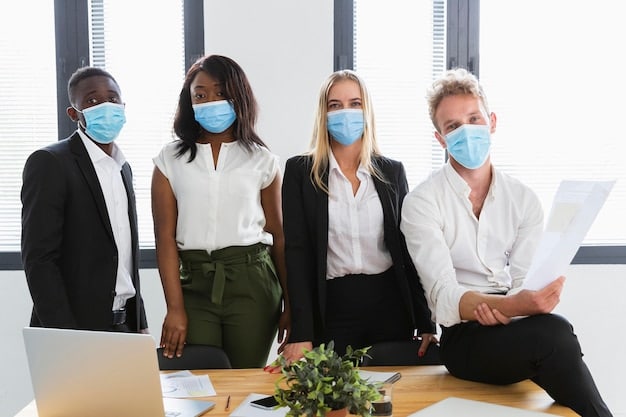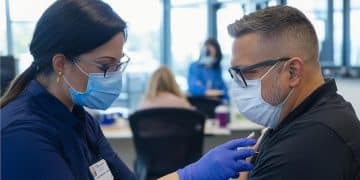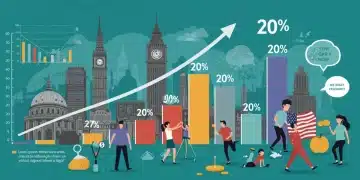CDC Guidelines 2025: How Respiratory Virus Prevention Will Change

How Will the Updated CDC Guidelines on Respiratory Virus Prevention Impact Your 2025 Health Strategy? The updated CDC guidelines will likely lead to a greater emphasis on individual responsibility in managing respiratory virus risks, impacting workplace policies, school protocols, and personal healthcare decisions in 2025.
Navigating the complexities of public health can be challenging, especially with evolving guidelines. As we look to 2025, understanding How Will the Updated CDC Guidelines on Respiratory Virus Prevention Impact Your 2025 Health Strategy? becomes crucial for individuals, businesses, and healthcare providers alike.
Understanding the CDC’s Updated Guidelines on Respiratory Viruses
The Centers for Disease Control and Prevention (CDC) regularly updates its guidelines to reflect the latest scientific understanding of respiratory viruses. These updates are essential for mitigating the spread and impact of viruses like influenza, RSV, and COVID-19.
Key Changes in the Updated Guidelines
The updated guidelines may include changes to recommendations on vaccination, testing, isolation, and mask-wearing. Understanding these changes is vital for effective prevention strategies.
- Emphasis on Individual Responsibility: Expect a greater focus on personal decision-making regarding prevention measures.
- Updated Vaccination Recommendations: Stay informed about the latest vaccine recommendations for different age groups and risk categories.
- Revised Guidelines on Isolation: Understand the updated rules for isolating when sick to minimize transmission.
These changes reflect a shift towards sustainable, long-term strategies for managing respiratory viruses in our communities.
In conclusion, staying informed about the CDC’s updated recommendations is crucial for protecting yourself and others from respiratory viruses.
The Impact on Workplace Health Strategies
Workplaces will likely need to adapt their health strategies to align with the CDC’s updated guidelines. This may involve revising policies on sick leave, remote work, and workplace hygiene.

Revising Workplace Policies
Workplaces should review and update their policies to reflect the latest recommendations on testing, isolation, and mask-wearing. Clear communication and flexible arrangements can help support employee health and productivity.
Employers who proactively address these concerns can create a healthier, more supportive work environment.
Workplaces that prioritize employee health and well-being are better positioned to navigate the challenges of respiratory virus season.
School Protocols and Childcare Settings
Schools and childcare settings will also need to adapt their protocols to align with the CDC’s updated guidelines. This may involve changes to classroom layouts, hygiene practices, and policies on sick children.
Implementing Preventive Measures
Schools can implement measures such as improved ventilation, regular handwashing, and encouraging vaccination to minimize the spread of respiratory viruses.
- Enhanced Hygiene Practices: Promote regular handwashing and provide hand sanitizer in classrooms and common areas.
- Improved Ventilation: Ensure adequate ventilation in classrooms and other indoor spaces to reduce airborne transmission.
- Flexible Attendance Policies: Implement flexible attendance policies that allow sick children to stay home without penalty.
These measures can help create a healthier learning environment for all students.
By being proactive, schools can minimize the impact of respiratory viruses and ensure a safe, healthy learning environment for all students.
Personal Healthcare Decisions in 2025
Individuals will need to make informed decisions about their healthcare based on the CDC’s updated guidelines. This may involve considering vaccination, testing, and personal prevention measures.

Staying Informed and Proactive
Staying informed about the latest recommendations and taking proactive steps to protect your health can help minimize the risk of infection.
Individuals who prioritize their health and well-being are better equipped to navigate the challenges of respiratory virus season.
Making informed decisions about your healthcare is essential for protecting yourself and your community.
The Role of Vaccination in Respiratory Virus Prevention
Vaccination remains a critical tool in preventing severe illness and hospitalization from respiratory viruses. The CDC’s updated guidelines will likely emphasize the importance of staying up-to-date on recommended vaccines.
Understanding Vaccine Recommendations
It’s essential to consult with your healthcare provider to understand the latest vaccine recommendations for influenza, RSV, and COVID-19. Vaccination can help protect you and your loved ones from severe illness.
- Influenza Vaccination: Annual flu shots are recommended for most individuals, especially those at high risk of complications.
- COVID-19 Vaccination: Stay informed about the latest COVID-19 vaccine recommendations and booster schedules.
- RSV Vaccination: RSV vaccines are now available for certain age groups and high-risk individuals.
Vaccination is a safe and effective way to protect yourself from respiratory viruses.
By staying up-to-date on recommended vaccines, individuals can significantly reduce their risk of severe illness and hospitalization.
The Future of Respiratory Virus Prevention
Looking ahead, the future of respiratory virus prevention will likely involve a combination of individual responsibility, public health measures, and technological advancements. Staying informed and adaptable will be key to navigating the evolving landscape of respiratory viruses.
Embracing Innovation and Adaptability
Emerging technologies, such as improved air filtration systems and rapid diagnostic tests, may play an increasingly important role in preventing the spread of respiratory viruses. Staying adaptable and embracing innovation will be essential for effective prevention strategies.
By embracing innovation and staying adaptable, we can create a healthier and more resilient society.
The future of respiratory virus prevention will require a collaborative effort from individuals, communities, and public health organizations.
| Key Point | Brief Description |
|---|---|
| 🦠 CDC Guidelines Update | Stay updated on the latest CDC recommendations for respiratory virus prevention. |
| 💉 Importance of Vaccination | Vaccination remains a critical tool for preventing severe illness from respiratory viruses. |
| 😷 Workplace Adaptations | Workplaces should revise policies on sick leave, remote work, and hygiene. |
| 🏫 School Protocols | Schools need to adapt protocols for classroom layouts, hygiene, and sick children policies. |
FAQ
▼
The key changes may include a greater emphasis on individual responsibility, updated vaccination recommendations, and revised guidelines on isolation and mask-wearing.
▼
Workplaces will need to revise policies on sick leave, remote work, and workplace hygiene to align with the updated recommendations.
▼
Schools can enhance hygiene practices, improve ventilation, and implement flexible attendance policies to minimize the spread of viruses.
▼
Vaccination remains a critical tool in preventing severe illness. Stay up-to-date on recommendations for influenza, COVID-19, and RSV vaccines.
▼
Individuals should stay informed about the latest guidelines, consult with healthcare providers, and take proactive steps to protect their health.
Conclusion
In conclusion, the updated CDC guidelines on respiratory virus prevention will significantly impact health strategies across various sectors in 2025. Being informed, adaptable, and proactive will be key to navigating this evolving landscape and ensuring the health and well-being of individuals and communities.





